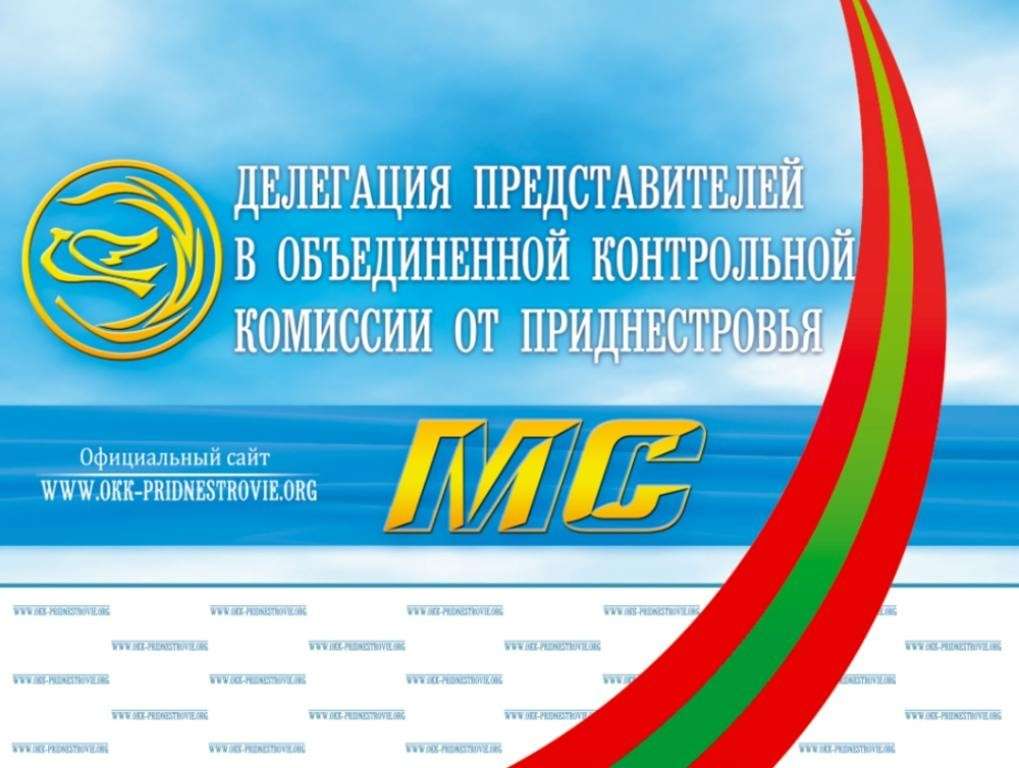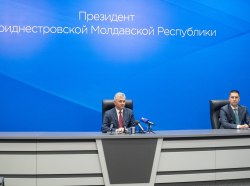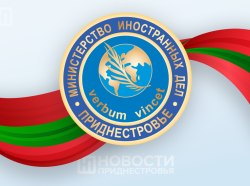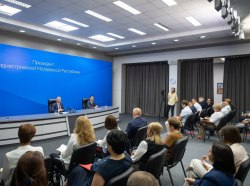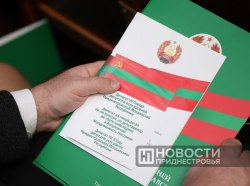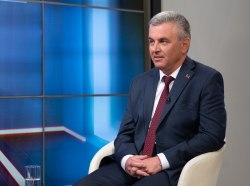Tiraspol, December 17. /Novosti Pridnestrovya/. The Pridnestrovian delegation to the Joint Control Commission issued a Statement "On the inadmissibility of the peacekeeping operation guidance documents arbitrary interpretation and attempts to incorrectly change the JCC powers ". We present the text of the document without changes.
“The Pridnestrovian delegation considers it necessary to express its views in connection with the issuance of Statements No. 23-18-1940 dated 10/7/2020 and No. 23-18-2272 dated 12/9/2020 by the Moldovan delegation to the JCC, since they are a model of unfair interpretation of norms of the peacekeeping operation basic documents, as well as JCC decisions issued in their development.
First of all, it should be noted that the aforementioned statements of the Moldovan delegation to the JCC do not contain indications of cases of the violation of 1992 Agreement regulations by the Pridnestrovian side in terms of fulfilling the tasks set for the Joint Control Commission and the requirements for it to maintain stability in the Security Zone and prevent the resumption of hostilities between conflicting parties. The Moldovan delegation declares the whole set of its claims to the negotiation process, which was started by this Agreement, while diligently trying to transfer it to the Security Zone.
In the documents of the Moldovan delegation to the JCC No. 23-18-1940 dated 10/7/2020 and No. 23-18-2272 dated 12/9/2020 there are announcements that the Pridnestrovian delegation allegedly does not provide answers to the questions posed by the Moldovan side and accusations against the Pridnestrovian colleagues.
However, apparently, it is these answers that the Moldovan delegation prefers not to notice, since they do not correspond to the objectives stated by the authors of the above documents.
For this reason, the Pridnestrovian delegation to the JCC has repeatedly drawn and once again draws the attention of the Commission participants to the fact that the Moldovan side is constantly trying to unreasonably change the JCC powers at the expense of the competence of the negotiation process to resolve the armed conflict on the Dniester.
In this regard, we remind you once again that in accordance with Article 1 of the Agreement of July 21, 1992, the peacekeeping operation is taking measures to cease firing completely, as well as any armed actions against each other, to disengage armed forces and other armed formations, military equipment and weapons in order to create a Security Zone. Article 2 of the Agreement quite unequivocally establishes that a Joint Control Commission is established to monitor the implementation of these activities and ensure the security regime in the said zone. We have to repeat - to monitor the implementation of these, and not any other activities in the Security Zone.
And now let's look what not only the above-mentioned appeals, but also a huge set of similar documents previously issued by the Moldovan delegation to the JCC are actually aimed at.
It is immediately striking that the members of the Moldovan delegation arbitrarily try to "blow out" the issues of preventing the resumption of hostilities in the Security Zone beyond recognition.
There is a clear desire to turn them into political, administrative, criminal, civil law, economic, educational, trade and other similar problems that are inevitable until the full settlement of the armed conflict, but can only be resolved politically in the course of appropriate negotiations at quite certain sites, but in no way in the Joint Control Commission, designed to prevent the resumption of hostilities and facilitate the negotiation process, and not resolve issues outside the framework of these clearly defined tasks.
Meanwhile, the Moldovan colleagues declare the tasks of the JCC to be almost all-inclusive and do it openly, with a sense of the apparent superiority of their position, with a clear expectation of external support. Thus, declaring “prolonged stagnation in the work of the JCC” (Statement No. 23-18-2272 dated 12/9/2020), the Moldovan delegation to the JCC did not say a word about what caused this “stagnation”.
Meanwhile, the demands of the Pridnestrovian side to discontinue the practice of refusing to sign acts of military observers of the four sides, JMC reports on the situation in the Security Zone, which is expressly prohibited by JCC protocol No. 614 of March 6, 2008, have invariably been ignored by the Moldovan delegation.
At the same time, in the Statement No. 23-18-2272 dated 12/9/2020, there is absolutely unthinkable misrepresentation of the norms that constitute the protocol of the JCC No. 614 of March 6, 2008. This is clearly intended for an unprepared audience, presented as a decision that the Pridnestrovian side allegedly violates.
Thus, the authors of the Moldovan Statement write that the Pridnestrovian delegation to the JCC in its arguments refers to paragraph 2.1 of the JCC protocol No. 614 of March 6, 2008 - and this is true. But further, the Moldovan delegation points out that, allegedly, “for 12 years, representatives of the Pridnestrovian region have been ignoring and blocking the implementation of paragraph 2.8 (4) of the same protocol, which suggests “determining the procedure for the preparation, recording and considering information of military observers, which is not included in acts due to lack of consensus", thereby hindering preparation of frank weekly reports".
However, “paragraph 2.8 (4)” is not an established norm, but only one of the proposals of “the Ukrainian side on the JMC reports on the situation in the Security Zone for the periods from 23 to 29 January 2008, from 6 to 12 February 2008, from 13 to 19 February 2008, from 20 to 26 February 2008”, recommended by the JMC for work on amendments and additions to the current Instruction of military observers.
Does the Pridnestrovian side block this paragraph? Absolutely NO. The Moldovan side more likely does it. All these years, Moldovan colleagues have categorically insisted on such a procedure for the preparation, recording and considering information of military observers, which would include political, administrative, criminal, civil, economic, educational, financial, trade and other problems that are not within the competence of the JCC. Other opinions, including the direct provisions of the 1992 Agreement, are categorically rejected by the Moldovan colleagues. The principle is simple: either it has to be the way Moldovan side demands, or none.
But the Moldovan Statement No. 23-18-2272 dated 12/9/2020 does not contain such explanations. This document seems to have very different objectives.
There is another aspect which the authors of the Moldovan statements emphasize. This, as they point out, "is a matter of particular importance and urgent, which concerns the gross violation of fundamental rights and freedoms of citizens - this is the work of the Pridnestrovian law enforcement agencies to prevent and suppress the commission of crimes, carried out in the Security Zone."
The Pridnestrovian delegation provided a full response to this question, but the Moldovan side does not want to notice it. It also does not want to report dozens of Pridnestrovian citizens abducted by the Moldovan special services from the territory of Pridnestrovie, including the Security Zone, some of whom have been in prison in the Republic of Moldova for years. Also, it does not want to terminate the criminal cases initiated against the Pridnestrovian officials conducting their official duties, which do not coincide with the Moldovan legislation. Yet this is precisely what every participant in the conflict settlement process encourage them.
In the same way, the Moldovan side does not notice the Pridnestrovian colleagues` proposals to stop unworthy manipulations with the terms designating the parties to the conflict. In accordance with the Agreement of July 21, 1992, the place of the conflict was determined unambiguously - the Pridnestrovian region of the Republic of Moldova. The parties to the conflict are the conflicting parties, which in subsequent documents are designated by the signatures of the first persons of these parties as the Republic of Moldova and Pridnestrovie.
The way the Moldovan delegation members react to such comments, including in Statements No. 23-18-1940 of 10/7/2020 and No. 23-18-2272 of 12/9/2020, continuing to appeal to the geographical term “The Pridnestrovian region of the Republic of Moldova” as a proper name, only reflects the unwillingness of the Moldovan side to make any compromises. Even if there are image-building losses for the Republic of Moldova.
This is part of the claims stated in the documents of the delegation of the Republic of Moldova in the JCC No. 23-18-1940 dated 10/7/2020 and No. 23-18-2272 dated 12/9/2020, which cannot but be answered. It must be admitted that there are other demands of permanent and one-sided accusatory nature, to which the Pridnestrovian delegation has repeatedly given detailed answers. It's probably not worth repeating them once again.
Unfortunately, the accusatory rhetoric of the Moldovan delegation, which is pretty straightforward, does not imply any concessions. This is clearly a provocative activity that must be stopped. Once again, we remind our Moldovan colleagues that the framework of the JCC's competence is determined by the 1992 Agreement and cannot be changed by the Commission decision. Blocking the JCC work and its institutions does not contribute to the effectiveness of the negotiation process to resolve the armed conflict, which the peacekeeping operation is designed to support. We call on our Moldovan colleagues to be correct in assessing events, including in the work of the Commission itself, as well as its military institutions.

